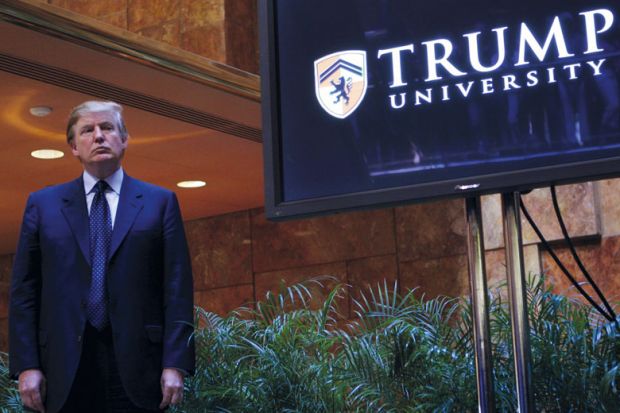Donald Trump’s proposal to create a national, free online university as an antidote to “woke” universities is “entirely politics”, adopting tactics from flagging Republican rival Ron DeSantis, but connects with wider concerns about higher education’s cost, inflexibility and perceived failure to use endowments for public good.
The front runner for the Republican presidential nomination has proposed the creation of an “American Academy”, funded by raising “billions and billions of dollars” from “taxing, fining and suing excessively large private university endowments”, to “compete directly” with “very costly” four-year universities.
Using divisions on campuses over the Israel-Gaza conflict as the pretext for his idea, Mr Trump said the US spends “more money on higher education than any other country and yet they’re turning our students into communists and terrorists”, in a video shared on his Truth Social website.
Jon Fansmith, senior vice-president for government relations and national engagement at the American Council on Education (ACE), the main US higher education lobby group, said the plan was light on “specifics”, describing the proposed funding method as “erratic” and “clearly not viable”.
“But this is entirely politics,” continued Mr Fansmith. “He [Mr Trump] has made a point of demonising colleges and universities and academics generally – the proposal is really about trying to co-opt some of the areas in which Governor DeSantis has gained attention.”
Mr Trump, who previously created the failed Trump University, said the American Academy would be “strictly non-political and there will be no wokeness or jihadism allowed”.
Although Mr Trump was unlikely to be worried about Mr DeSantis as a rival in the Republican nomination race, he was “looking to co-opt the areas where DeSantis tapped a nerve among the Republican base and one of those, prominently, was attacks on higher education”, said Mr Fansmith.
Noting that level of education is now “a really defining element in how voters identify”, he continued of the Trump plan: “Is it a good faith, substantive proposal about a way to advance higher education? No, probably not. Is it a messaging argument that will resonate with the voters he [Mr Trump] cares most about? Probably yes.”
On endowments, the proposal from Mr Trump – whose administration introduced a new tax on endowments in 2017 – might boost the case of those urging universities to reform at their own volition, rather than await further political or tax pressure amid growing concern about the use of this wealth from right and left.
Bruce Kimball, professor emeritus of educational studies at Ohio State University, and co-author with Sarah Iler of Wealth, Cost and Price in American Higher Education: A Brief History, said Mr Trump’s reference to endowments was “simply an attack on putative, wealthy, liberal elites”.
But he added: “In any event, the aggressive pursuit of wealth by the richest universities does continue to increase the populist and partisan resentment against ‘these crown jewels’ of American higher education and, by extension, all of higher education, we argue.”
Professor Kimball said that wealthy universities could take steps to share the benefits of their endowment wealth, by measures such as guaranteeing “the bond issues of selected non-wealthy colleges, such as historically black colleges and universities”.
And Dr Iler, assistant director of academic planning and institutional research at the University of North Carolina’s School of the Arts, noted the example of the University of Pennsylvania, with a $21 billion (£17 billion) endowment, which pledged to contribute $10 million annually for 10 years to renovate public school buildings in Philadelphia, in lieu of taxes.
“By modestly increasing the restrictive spending rules on their endowment income and carefully subventing selected, needful colleges or school systems, the wealthy elites would be investing to rebuild public esteem and political support for themselves and all of higher education,” she added.
Meanwhile, Mr Trump pledged an institution offering “a universe of the highest-quality educational content…whether you want lectures in ancient histories or an introduction to financial accounting or training in a skilled trade”.
Steven Mintz, professor of American history at the University of Texas at Austin, former executive director of the Texas system’s Institute for Transformational Learning, said that while Mr Trump was aiming to “own the liberals” in his university proposal, there was “a growing demand for a free, asynchronous, online education among working adults and family caregivers”.
Professor Mintz said he could “imagine an approach that might work: an online marketplace offering access to various high quality online courses and certificate and credentialing programmes”, which was “the vision behind the original edX and Coursera Moocs” before that was abandoned “under intense pressure to achieve financial sustainability”.
ACE’s Mr Fansmith acknowledged that Mr Trump had mentioned “workforce-based training, making it affordable and making it accessible”. There is a need for “a better federal alignment around all types of post-secondary education”, rather than just aid for people to gain degrees, Mr Fansmith added.
“Regardless of partisan views, highlighting that need for change in our policies to better reflect what’s actually happening is something I think colleges and universities would agree with former President Trump on,” he said.
Register to continue
Why register?
- Registration is free and only takes a moment
- Once registered, you can read 3 articles a month
- Sign up for our newsletter
Subscribe
Or subscribe for unlimited access to:
- Unlimited access to news, views, insights & reviews
- Digital editions
- Digital access to THE’s university and college rankings analysis
Already registered or a current subscriber? Login








